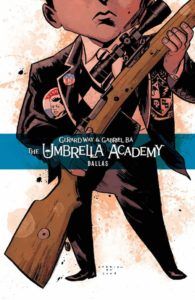Netflix has a major hit on their hands with The Umbrella Academy, based on the comic book series of the same name by Gerard Way and Gabriel Ba. Of course, adaption leads to changes from the source material, so here’s a rundown of The Umbrella Academy: comic vs. show.
The following contains heavy spoilers for the first two seasons of The Umbrella Academy, as well as the first two books of the comic: Apocalypse Suite and Dallas.
The World is Weirder
Issue #1 of The Umbrella Academy sees the team of 10-year-old Hargreeves children taking on The Eiffel Tower, which is actually a spaceship. And a cybernetic, zombie Gustav Eiffel is piloting it. Oh, and the 43 special children were born in the moment when “Tusslin’ Tom” Gurney knocked out a space squid with an atomic elbow drop. That’s just the tip of the delightful iceberg of weird that is the comic.
In the Netflix show, the Hargreeves children are exceptional. They are seven super-powered people in a world largely like our own. So yeah, Gerard Way and Gabriel Ba leaned hard into the weirdness in a way the show just didn’t.
Diversity
In Netflix’s show, Emmy Raver-Lampman, a Black woman, portrays Allison. Ben is portrayed by Justin H. Min, a Korean American. David Castañeda, a Mexican American, steps into the role of Diego. In the comic book, however, all seven of the Hargreeves children are white, which doesn’t make much sense since the 43 special children were born all around the world. In the comic, Diego even has blonde hair.
Netflix also amped up the diversity by bucking the heteronormativity of the comics. All the Hargreeves children (so far as the books tell us) are straight, including Klaus and Vanya. In the show, Vanya is a lesbian with a beautiful relationship in the second season. Klaus is bisexual or pansexual (he never clearly delineates). Much love to Netflix for infusing diverse stories into their adaptation.
Villains and Violins

In the show, Vanya’s journey to becoming the living apocalypse is one of deep depression. Her father and family rejected her, the one who was never special, and her published memoir further isolated her from the rest of the Hargreeves children. Her powers manifest from a place of anger and resentment, but she always remains a victim of her own abilities and life.
In the comic, however, Vanya is the big bad of the first volume, Apocalypse Suite. The villainous Conductors captures, tortures, and brainwashes her. In her first rehearsal, she unleashes her power and kills The Conductor, and then leads her orchestra on a purposeful path of vengeance against her family.
Where is The Commission?
Fan-favorite villains Hazel and Cha-Cha make their presence known early in season one of The Umbrella Academy, but they’re nowhere to be found in book one of the comic. There’s also no mention of the covert, timeline-protecting agency they work for: The Commission. The comic only hints at Five’s interactions with Temps Aeternalis (the comic name for The Commission), when he kills three mysterious strangers in a cafe, and then tells Pogo that he did some things in order to return to the present.
For that matter, time travel plays practically no part in the Apocalypse Suite comics. Of course, Five returns from spending 50 years in the future, and he mentions JFK to Pogo, but that’s it. No Commission, no briefcases, and no mention of Klaus in Vietnam.
Speaking of Vietnam
The Vietnam War carries a lot of narrative weight in the Netflix show. In season 1, Klaus manages to get one of The Commission’s time-travel briefcases from Cha-Cha and Hazel. He opens it and is transported to the 1960s. He fights in the war and falls in love with a young man named David, who dies. This affects Klaus deeply, and comes back around in a subplot in season 2: Klaus tries to keep David from enlisting.
In the comic, the entire fifth issue of the Dallas arc is the Vietnam War. Klaus uses the body of a dead Temps Aeternalis agent to transport himself, Luther, and Diego back in time to stop Five from killing JFK. They miss by three years and several thousand miles, so they kill time by fighting in the war. With vampires. And mummies. And Luther grows Santa Claus beard and hair. It’s different.
Where is Ben?
Here’s a major departure in The Umbrella Academy comic vs. show. They have one thing in common with Ben: he died as a child in one of the team’s many battles. In the Netflix show, he’s a constant frenemy to Klaus, who can commune with the dead. Ben even possesses Klaus for a time in season 2, and has a gut-wrenching moment with Vanya near the end of the season.
In the comic? He’s in flashbacks as a child. That’s it. He’s not the undead angel on Klaus’s shoulder. He doesn’t possess anybody. He doesn’t get that moment. He’s just not there.

Vanya in Dallas
In the comic, Vanya survives being shot in the head by Five, but is bedridden through the events of Dallas. Her motor skills are gone, as is her memory, though doctors suspect she’ll get her memories back. Gerard Way and Gabriel Ba leave her on the sidelines.
In the Netflix show, Vanya travels to the 1960s with the rest of her family, but is dropped off on her own, but also with no memories. She becomes the live-in nanny for a family, and develops a doomed romantic relationship with the mother of the family. The story is emotional and complicated and shows Vanya using her powers for good. And it’s entirely absent from the comics.
Allison in Dallas
Allison isn’t quite so sidelined as Vanya in the Dallas storyline of the comic, but almost. She is largely absent from the action until the absolute climax, in which she plays a pivotal role in ensuring JFK dies on November 22, 1963.
The Netflix show played to its cast, thankfully. Since they cast a Black woman as Allison, they knew they couldn’t have her in Dallas in 1963 without dealing with the Civil Rights Movement. She falls in love and marries. She and her husband are at the forefront of fighting for civil rights in Dallas, even participating in a lunch counter sit-in, harkening to the late John Lewis in Nashville.
For me, this was the most compelling part of season 2. The lunch counter sit-ins were very real forms of peaceful protest in the 1960s, embodying Dr. Martin Luther King’s pacifist ideology. Seeing Allison trying to make the world better—entirely without her rumor abilities—was powerful.
Among Other Things…
The list of small details that are different in The Umbrella Academy comic vs. show goes on and on. Luther’s head is transplanted onto a Martian ape body (comic) instead of genetic experimentation (show). Intelligent chimps like Pogo are everywhere in the comic. Klaus’s hippie love cult only exists in the show. Klaus has telekinesis and can possess people in the comic. The list goes on and on.
Catch up and read the final volume, The Umbrella Academy: Hotel Oblivion, while we wait for the third season of the show…whenever that’s happening.
Source : 8 Major Changes: THE UMBRELLA ACADEMY Comic vs. Show













